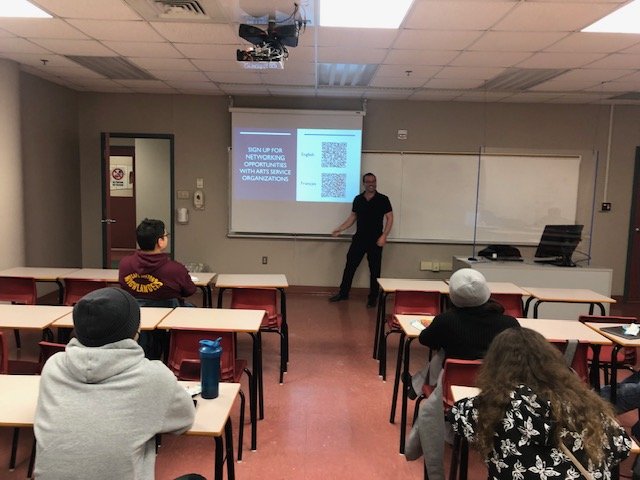The Art of Managing Your Career: Q&A with Grégoire Gagnon of the Cultural Human Resources Council
Whether you’re an arts student or new arts grad who's looking to make your mark, or you’re a professional artist who’s early into your career, our upcoming workshop "The Art of Managing Your Career” (TAMYC) is for you.
This is the second time that we’ve offered this robust session, which will provide emerging self-employed artists and cultural workers with information that’s vital to managing their careers. Held in partnership with College of the North Atlantic (CNA) and the Cultural Human Resources Council, and funded by the Canada Council for the Arts, this free, hybrid event will take place on Wednesday, October 18 in-person at CNA’s Prince Philip Drive Campus and online via Microsoft Teams.
We recently spoke with facilitator Dr. Grégoire Gagnon, Executive Director of the Cultural Human Resources Council, about some of the realities of working in the arts and what you need to know to thrive.
This interview has been edited for length and clarity.
Business & Arts NL: Who is the intended audience for this session? And can you give an overview of the topics you’ll be covering?
Grégoire Gagnon: The initial intended audience that we got funding for, from Canada Council, was students - particularly students that are at the end of a study cycle, so near the end of an undergrad, possibly the end of graduate studies, but especially for artistic disciplines.
We know that schools, universities, colleges produce really great artists and people that want to create content and generate cultural products. One of the things that we don't always do correctly is inform students ahead of time about the market realities and the fact that, as much as they may want to study and continue studying, eventually it can really boil down to an entrepreneurial scenario where if they want to produce cultural products and goods, they actually need to generate them and have that entrepreneurial approach.
With this workshop, we’ve got it divided into three parts: Knowing the market, knowing yourself and knowing your project. Knowing yourself is very short - it's a few self tests to assess some very light things, a bit of introspection...it's just a bit of an exercise to think about these things ahead of time.
Knowing the market really helps students that are going into the market eventually understand the realities that are tied to it... and then after that, giving them some very high-yield, low-effort frameworks tied to the business side of things so that they can create their own business model, so that they can understand their own competitive edge and whether that competitive edge is sustainable or not. We do look at things like the AIDA funnel and the marketing Four Ps, and these are tried, tested and true frameworks for the business or marketing side of things that really help people flesh it out properly so that they can go from idea to reality.
Somebody who's already fully established can also use these same frameworks to turn around and pivot - we saw a lot of that during the pandemic - or to launch new ideas or new projects...So this is just to get the thoughts rolling, but it does really help for any project that we want to start, or starting up the business side of artistic production.
Another key point that we try to drive home is that if you want to generate art, whatever discipline you are in, and you want to make money, you need to see it as a business, not just an artistic production...If you want to just make art for art's sake, okay great, do it. If you want to sell it, you need to have some form of business setup.

Business & Arts NL: For students who are just getting into the job market and looking for employment in the arts, whether that be TV/film, music, theatre, etc., what particular challenges might they be facing at this point in time?
GG: Right now things are tough because, if we think about anything that has to do with live performing arts, getting people into venues is a challenge. Call it the Netflix reality from the pandemic...everything seems to come straight to the door. People don't necessarily want to leave as much. I think there's an appetite for people to get back out there. But also the costs involved with large-scale productions doesn't necessarily meet the market demand and people are questioning a lot of things in terms of social reality. So there's a lot to think about.
And with social media and all the Internet communications, it’s really hard to step away from the pack and be seen and be heard...if we want people to consume the goods and services that we're producing, we need to actually be able to reach them…but if you know what you're doing and what's unique about what you're doing, it makes it much more easy to communicate that value proposition and make it appealing for people, because people do have an appetite for consumption of artistic and cultural goods and services. So it's finding that niche where you're going to thrive with what you want to do and finding that connection with the people that want what you do. So it's the same problems that I guess existed even 50 or 100 years ago, it's just that times have changed, technology has changed.
Cultural workers across the board, if we look at pre-pandemic levels, were making $8,300 less per year than the Canadian economic average for full-time work...Why? We don't think about monetizing what we're doing and how to monetize what we're doing. We're really focused on delivering and creating, but we don't pay enough attention on how to make money with it. And sometimes the answer is, ‘I really love making this, but there is no market for it. However, there's a market for this other thing that I also enjoy doing, or I'd like to do, and this will get me money.’
A really important piece of that puzzle is: Who is your audience? If you want to be a live performer, I'll say (in) St. John’s…then you have to recognize that locally, there's X amount of pubs that will allow you to play live. So the amount of time that you can spend actually generating that revenue is a reality. Are you an artist who's going to be touring the entire Rock itself? Okay, then that grows your audience base. Thinking about your reach, who is your clientele, will really help you in that business plan. If you say 'I want to be a Canadian touring artist, the entirety of Canada' - okay, well that changes that...Make sure that in whatever space you're competing for those dollars, (you’re) also not competing with things that are outside of, let's say, live performance or music in pubs. If you try to program a show on the same night as a hockey game, there's a fair chance that the hockey game will end up drawing some of your crowd away. So it's thinking about those things as well.
Let's say you're an artist that really likes hockey as well, this could actually be a way of formulating a business plan, saying, 'I'm going to go to pubs where they've got the TV and they've got the hockey game going on.' But you talk to the owner and you say, 'I will play during the intermissions instead of during the game.' So you've just set yourself up, you know that that person is going to have a crowd because it's going to be packed with people that want to watch the game, and you're going to be providing some entertainment in between the periods. So it's thinking about where can I park myself? Where can I put myself, be visible, be seen, be heard, so that I can generate that cash? Where's the audience going to be? Sometimes it's not a question of bringing the audience to you, but you going to the audience. And that can apply to whatever scenario we're talking about...it could be the same thing with visual arts: Do I try to bring people to my studio or do I go out there and meet potential clients wherever they are?
Anybody can sit down with the frameworks that we present and share and spend half a day, an afternoon...filling out these frameworks and thinking about things, and it can actually generate more ideas and potentially success or greater success. So I encourage everybody who is heading into the arts to come and listen to this presentation.
Anybody who's already involved, this can be a really nice way to tune things up or park things in a very structured and logical manner so that when they do have new projects, (they) can tweak some bits and pieces here…One of the lessons we learn, oftentimes a bit later in artistic careers, is that (you) need to have a plan…have a game plan and then execute it.
Workshop: The Art of Managing Your Career
Date/Time: Wednesday, October 18 from 12:30-2:30pm NST
Location: Hybrid – in-person at CNA’s Prince Philip Drive Campus or online via Microsoft Teams
Price: Free
Registration: Click here to register


